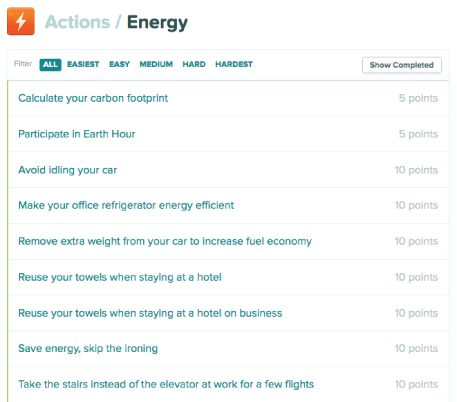Using this line of thinking, Shelton Group developed a series of Wasting Water Is Weird public service announcements featuring Rip the Drip, who shows up just in time to embarrass a person unconsciously wasting water. The PSAs aired about 24,000 times on 290 TV stations in more than 120 markets and received more than 150,000 views on YouTube, according to Penny Kemp, vice president of account management at Shelton. Through its Eco Pulse survey the company also found that nearly one-third of people who saw the PSAs were moved to change their water-use habits. This subtle shame—revealing to people that they are not following the accepted norm—is inherent in Cialdini’s social proof principle.
“It’s not about telling [people] that they’re wrong, as that never works. They are just not thinking about what they’re doing,” said Head. “You have to do it in a lighthearted and fun way so that you make a problem visual. And then you have to give them some prescriptive things to do. It’s got to be simple and it’s got to be easy.”

This screen shot from Practically Green shows how environmentally friendly activities translate into points players can use to compete with each other.
Robin Krieglstein, senior producer of Badgeville, agreed. “We don’t realize over the course of a week or a month we even do some of these behaviors,” he said at the panel. “If you actually begin to track how many times people are doing a behavior, then you can set clear goals, like trying to turn off the water while brushing.” Games offering congratulation messages, badges and scores encourage people to continue their efforts, and Krieglstein said research shows that a “congratulations” in a game provides a similar effect in the brain as if it were spoken aloud by a person.
But Does It Work?
Head says it’s not necessary to make people believe in climate change or be concerned about other environmental issues to make them take action. “I don’t care about their motivation, I don’t care that they do it for the right reason,” she said at the panel. “I want to figure out what their motivation is, tap into that and get them to act. What matters is the end result.” If the motivation is simply competitiveness, then so be it.
But does it work? Preliminary results suggest yes. Above and beyond behaviors users already engaged in, in just two years Practically Green online has encouraged 1.7 million environmental actions and saved 1.5 million gallons of fuel, 57 million gallons of water and 269 million pounds of carbon dioxide, according to Stevens.
“People want to take steps and actions when it’s smart for them, when it’s practical, and helpful,” said Stevens. She says gamification works by using the best behavioral science has to offer to motivate people to become sustainable—and it only takes a few minutes per day. “Not a single client says a few minutes a day focusing on sustainability is time wasted.” ![]()
This article originally appeared in the Spring 2013 print issue of Ensia.
Ensia shares solutions-focused stories free of charge through our online magazine and partner media. That means audiences around the world have ready access to stories that can — and do — help them shape a better future. If you value our work, please show your support today.
Yes, I'll support Ensia!

But policy makers and companies respond most quickly to the "will of the people". And most people don't just wake up one day and decide they need elected officials who will support a carbon tax or that they won't buy a washer that makes them push a button to turn off heat dry rather than making air dry the default for all washers. It's a journey to get people from "huh, I should do this" to "why is this so hard" to "there has to be a better solution". If game-based learning programs can help engage people to living and thinking in more conscious ways, I think they are a critical component of the grander solution we need.